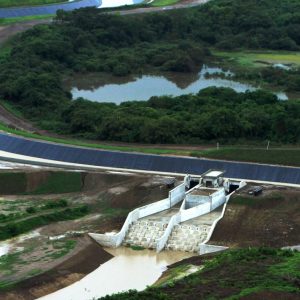The Stream, March 30: El Salvador Bans Metal Mining To Protect Water, Environment
The Global Rundown
El Salvador’s legislature voted to implement a nationwide ban on mining for gold and other metals, citing concerns about water supplies and the environment. Water scarcity due to droughts and damaged infrastructure are putting children in Nigeria, Somalia, South Sudan, and Yemen at greater risk of malnutrition, according to the United Nations. Researchers found that global food exports are withdrawing large amounts of groundwater at unsustainable rates. Scientists say a salt core drilled from the Dead Sea indicates a grim drought — unparalleled in human history — affected the Middle East thousands of years ago. Engineers have been able to repair the spillways at Syria’s Tabqa Dam on the Euphrates. Floods are limiting infrastructure repairs and evacuations from parts of Queensland hit by Cyclone Debbie. Cape Town, South Africa is proposing a steep water rate increase as supplies run low.
“Today in El Salvador, water won out over gold.” — Johnny Wright Sol, a member of El Salvador’s Legislative Assembly, after a vote Wednesday banned metal mining across the country in order to protect water supplies and the environment. El Salvador is the first country in the world to do so. (The New York Times)
By The Numbers
30 meters Thickness of a salt core drilled from below the Dead Sea, providing evidence that the Middle East endured an extreme drought when rainfall dropped to one-fifth of today’s levels. Researchers warn that climate change could once again desiccate the region. Climate News Network
63,000 homes and businesses Number without power in Queensland, Australia after Cyclone Debbie, a Category 4 storm, hit the coast on Tuesday. Floods have delayed efforts to repair infrastructure, and thousands of people are being evacuated from the Whitsunday Islands because drinking water supplies ran low. Guardian
19.25 percent Proposed water and sanitation rate increase in Cape Town, South Africa to fund investments in water security. In addition, the proposal would abolish a free water quota residents currently receive each month. The city is facing a severe drought that has drawn down reservoir levels to 17 percent of capacity. Times Live
Science, Studies, And Reports
Millions of children are at risk not only from starvation, but also from a lack of water in Nigeria, Somalia, South Sudan, and Yemen, according to the United Nations Children’s Fund. Unsafe water contributes to malnutrition, agency officials said, and fighting has damaged water points and infrastructure across the region. UN News Centre
A significant amount of the groundwater being drawn at unsustainable rates from the world’s aquifers is going to crops that are grown for export, according to a study published in the journal Nature. The global trade in food sucks up 11 percent of the non-renewable groundwater used for irrigation, researchers found. Two-thirds of this amount can be traced back to just three countries — India, Pakistan, and the United States. BBC News
In context: Learn how groundwater is being used recklessly around the world.
On The Radar
Engineers have repaired spillways at the Tabqa Dam on the Euphrates in Syria, according to statements by U.S.-backed forces. Government officials warned earlier this week that the dam had been damaged during fighting near Raqqa, increasing the risk of floods. Reuters
A news correspondent for Circle of Blue based out of Hawaii. She writes The Stream, Circle of Blue’s daily digest of international water news trends. Her interests include food security, ecology and the Great Lakes.
Contact Codi Kozacek





